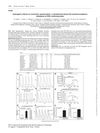Search
for
Sort by
Research
27 / 27 results
research Impact of Medical Castration on Malignant Arrhythmias in Patients With Prostate Cancer
Medical castration in prostate cancer patients can increase the risk of serious heart rhythm problems, so it's important to monitor heart activity during treatment.

research Anti-Anginal and Beta-Adrenoceptor Blocking Drugs
Beta-blockers and anti-anginal medications have various side effects and interactions that require careful monitoring and individualized treatment.

research Clinical Characterization of Men with Long QT Syndrome and Torsades de Pointes Associated with Hypogonadism: A Review and Pharmacovigilance Study
Low testosterone in men is a risk factor for a specific heart rhythm issue, and testosterone treatment may help prevent it.

research Androgenic Effects on Ventricular Repolarization
ADT, especially enzalutamide, may increase the risk of heart rhythm problems and sudden death in men.

research Cardiodermatology in the Physician’s Practice
Skin problems like psoriasis and systemic sclerosis can increase the risk of heart disease, so doctors should watch for heart risks in patients with these conditions.

research Potassium Channel Therapeutics at the Bedside
Potassium channel openers are effective in treating heart conditions, high blood pressure, pulmonary diseases, bladder issues, and hair loss, but more selective drugs are needed.

research Potassium Channel Openers: Therapeutic Potential in Cardiology and Medicine
Potassium channel openers show promise for treating heart disease and other conditions, but more research is needed to fully understand their effects and safety.

research Medication Repurposing: New Uses for Old Drugs
Old drugs can be used for new treatments, saving time and money, but there are challenges like needing more evidence and legal concerns.

research Tinea Capitis: A Practical Approach
The article concludes that proper antifungal treatment is essential for treating scalp fungal infections in children, and trichoscopy is useful for diagnosis and monitoring.

research Drugs That Affect Autonomic Functions or the Extrapyramidal System
Some drugs can cause serious side effects like heart issues and nervous system problems, but certain drugs for Parkinson's and overactive bladder may be safer, though they still have some common side effects.

research Cytostatics and Immunosuppressive Drugs: Toxicities and Management
Some cancer and immune system drugs can cause serious side effects, including heart, lung, nerve, and organ damage, which need careful monitoring and management.
research Cell Polarization Defects in Early Heart Development
Defects in certain proteins cause major heart abnormalities during early development.
research Hypogonadism as a Reversible Cause of Torsades de Pointes in Men
Low testosterone can cause a heart rhythm problem in men, but fixing it can prevent the issue.

research Androgenic Effects on Ventricular Repolarization: A Translational Study from Pharmacovigilance Databases to iPSC-Cardiomyocytes
Androgen-deprivation therapies increase the risk of certain heart conditions, but testosterone treatment may help.

research Hormone Receptor Positive, HER2 Negative Metastatic Breast Cancer: Impact of CDK4/6 Inhibitors on the Current Treatment Paradigm
CDK4/6 inhibitors have improved treatment outcomes for certain advanced breast cancer patients.

research Adverse Effects of Voriconazole: Over a Decade of Use
Voriconazole can cause serious side effects, especially in long-term use.

research Psychodermatology: The Intersection of Dermatology and Psychiatry
Many skin patients also have mental health issues, and doctors should treat both together.

research Compilation of a Comprehensive Gene Panel for Systematic Assessment of Genes That Govern an Individual’s Drug Responses
Researchers found that most genes affecting drug responses are not fully covered by commercial SNP chips, suggesting the need for more comprehensive tools to optimize drug selection based on genetics.

research Vandetanib-Associated Alopecia Areata in a Patient with Metastatic Medullary Thyroid Cancer
A cancer patient developed a type of hair loss after starting a cancer drug called vandetanib.

research Systemic Antifungals: Overview, Applications, and Costs
Terbinafine is the most effective medicine for fungal nail infections, especially for diabetics and those with weak immune systems.
research Understanding, Recognizing, and Managing Toxicities of Targeted Anticancer Therapies
Targeted anticancer therapies can cause severe side effects similar to traditional chemotherapy, but with different types.
research Case 2-2022: An Adolescent Male in Cardiac Arrest 3 Days After Liver Transplantation for End-Stage Liver Disease
The patient recovered well and returned to college without any lasting issues.
research Hydroxychloroquine and Chloroquine in Prophylaxis and Treatment of COVID-19
Hydroxychloroquine and chloroquine are not recommended for COVID-19 treatment due to insufficient evidence and safety concerns.

research Commonly Encountered Symptoms and Their Management in Patients With Cirrhosis
Cirrhosis affects quality of life with various symptoms, requiring a holistic, multidisciplinary approach for management.
research Toward a Unifying Hypothesis for Redesigned Lipid Catabolism as a Clinical Target in Advanced, Treatment-Resistant Carcinomas
Targeting lipid metabolism can help treat advanced, resistant cancers.

research Reporting on Adverse Clinical Events
Some medications and supplements can cause serious side effects, including hair loss, heart rhythm problems, liver injury, and other health issues.